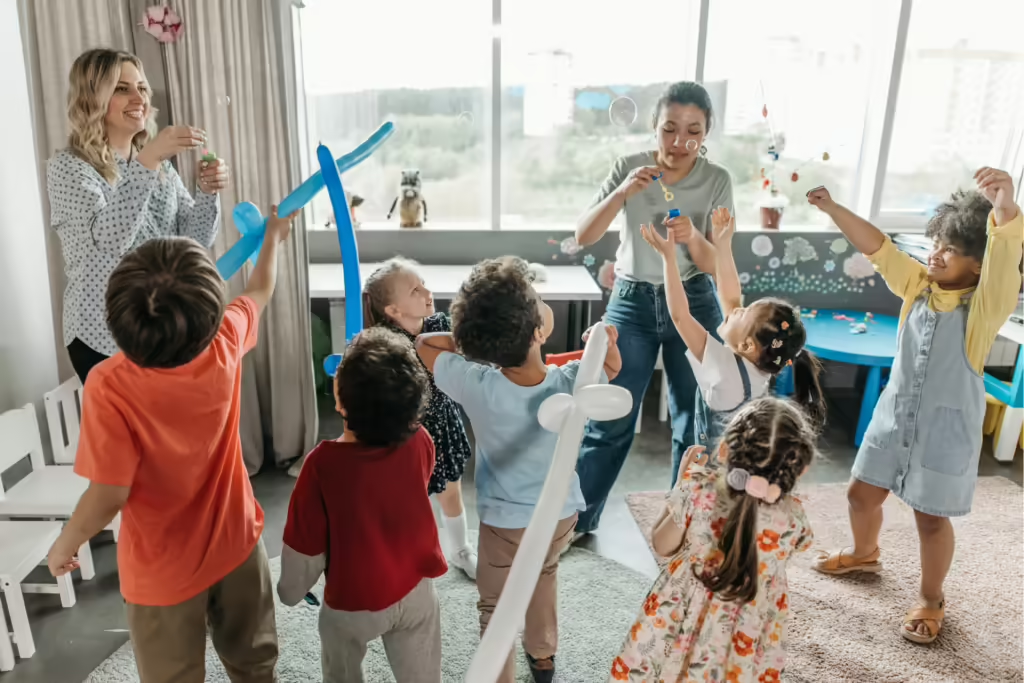In today’s fast-paced, technology-driven world, early childhood education plays a vital role in laying the foundation for lifelong learning and development. As parents, you want to give your child the best possible start in life, and one of the most effective ways to do that is by embracing the play-based learning approach. At Adventures Child Care, we believe that learning through play is the most natural and effective way for children to develop essential cognitive, social, and emotional skills. This post will explore the many benefits of play-based learning and how Adventures Child Care integrates it into our daily activities, setting children on the path to future academic and life success.
What is Play-Based Learning?
Play-based learning is an educational approach that emphasizes the importance of play in a child’s learning and development. Rather than relying solely on structured lessons and direct instruction, play-based learning encourages children to explore, create, and experiment in a hands-on, child-led environment. Through play, children engage in critical thinking, problem-solving, and social interactions that promote a deeper understanding of the world around them.
Play-based learning is not aimless or unstructured. It is guided by educators who carefully observe the children, introduce concepts when appropriate, and support their natural curiosity. This method ensures that learning is enjoyable, self-directed, and deeply meaningful to each child, aligning perfectly with their developmental stages and individual interests.
The Benefits of Play-Based Learning for Child Development
Play-based learning offers a wide range of benefits for children across various aspects of their development. Here are some of the key advantages:
- Cognitive Development
One of the most significant benefits of play-based learning is its positive impact on cognitive development. Play allows children to develop important cognitive skills, such as problem-solving, critical thinking, and decision-making. For instance, when a child builds a tower with blocks, they are experimenting with balance, measurement, and spatial awareness—skills that are foundational for later learning in math and science.
Through play, children also learn to make connections between ideas and concepts. At Adventures Child Care, we foster an environment where children are encouraged to ask questions, explore their surroundings, and find solutions through play-based activities. This exploration helps build neural connections that enhance memory, attention, and cognitive flexibility.
- Social Development
Play-based learning is a powerful tool for social development. As children engage in collaborative play, they learn to communicate, share, and cooperate with their peers. These social interactions help them develop empathy, self-regulation, and conflict-resolution skills, which are crucial for forming healthy relationships throughout their lives.
In group play activities at Adventures Child Care, children practice taking turns, negotiating rules, and working together toward a common goal. Whether it’s organizing a pretend market or working together to complete a puzzle, these experiences teach children how to navigate social dynamics and build meaningful connections with others.
- Emotional Development
Play offers children a safe space to express their emotions, cope with challenges, and build emotional resilience. Through imaginative play, children can explore different scenarios, roles, and feelings, helping them process their own emotions and understand those of others. For example, when a child pretends to be a doctor helping a sick patient, they are practicing empathy and care while gaining insight into their own feelings of concern or compassion.
At Adventures Child Care, we prioritize creating a nurturing environment where children feel supported and valued. By allowing them to engage in child-led play, we help them develop a strong sense of self-worth and emotional confidence. This foundation of emotional intelligence sets the stage for future success in both personal and academic contexts.
- Physical Development
Physical play is an essential component of play-based learning, contributing to a child’s overall health and development. Active play helps children improve their motor skills, coordination, and physical fitness. Whether they are climbing, running, or engaging in fine motor activities like drawing and building, play-based learning promotes healthy physical development.
At Adventures Child Care, we incorporate outdoor play and physical activities into our daily routines, ensuring that children have ample opportunities to move, explore nature, and strengthen their bodies. Physical play is not only important for physical well-being but also for enhancing focus and concentration when children return to indoor learning activities.
How Adventures Child Care Integrates Play-Based Learning
At Adventures Child Care, we believe in the power of play-based learning to shape well-rounded, curious, and confident individuals. Our program is designed to create a balance between child-led exploration and educator-guided learning opportunities. Here are some real examples of how we integrate play-based learning into our daily routines:
- Imaginative Play Stations
Our classrooms are equipped with imaginative play stations where children can engage in role-playing activities. From a pretend kitchen to a miniature construction site, these stations encourage children to experiment with different roles, solve problems, and work together with their peers. Educators support these activities by providing prompts and materials that enhance the children’s imaginative play experiences.
- Outdoor Exploration
We believe that the outdoors is one of the best classrooms for young children. At Adventures Child Care, we take learning outside as often as possible. Whether it’s a nature walk to observe plants and animals or building forts with natural materials, outdoor play allows children to explore the environment, develop gross motor skills, and engage with the world around them. This kind of unstructured play in nature encourages curiosity and fosters a connection with the natural world.
- Hands-On Learning
In addition to imaginative play, we offer a wide variety of hands-on activities that promote cognitive and fine motor development. Children participate in activities like building with blocks, painting, and sensory play with materials like sand, water, and clay. These activities not only enhance their understanding of scientific and mathematical concepts but also provide a creative outlet for self-expression.
- Social and Emotional Learning Activities
Our educators at Adventures Child Care actively incorporate social and emotional learning into the play-based curriculum. Group games, storytelling sessions, and collaborative projects are designed to help children practice important life skills, such as empathy, cooperation, and communication. Educators guide children in reflecting on their experiences, encouraging them to express their feelings and thoughts in a supportive environment.
Preparing Children for Future Success
The benefits of play-based learning extend far beyond the early childhood years. By fostering cognitive, social, emotional, and physical development through play, we are preparing children for success in school and beyond. Children who engage in play-based learning tend to exhibit greater creativity, critical thinking, and problem-solving abilities—skills that are highly valued in today’s world.
Moreover, play-based learning promotes a love for learning that lasts a lifetime. When children associate learning with joy, exploration, and discovery, they are more likely to approach challenges with curiosity and resilience.
Conclusion
At Adventures Child Care, we are committed to providing a learning environment where children thrive through play. By integrating play-based learning into our daily routines, we ensure that every child has the opportunity to develop essential skills that will serve them throughout their lives. Whether they are exploring the world through imaginative play or engaging in hands-on learning activities, our children are building the foundation for a bright and successful future.
If you want to learn more about how our play-based learning approach can benefit your child, contact us today to schedule a visit and see our program in action. We look forward to welcoming your family to Adventures Child Care, where learning and play go hand in hand.


